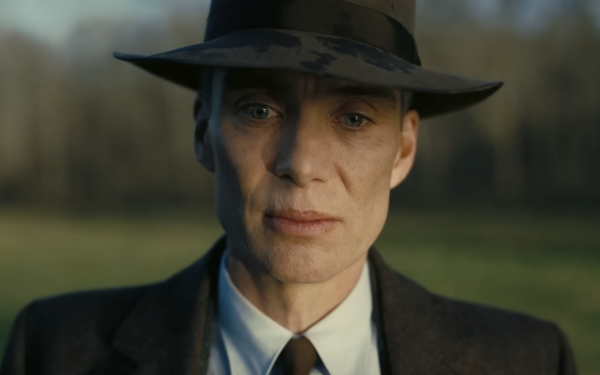
I’m writing this
before the Oscars broadcast, but it doesn’t take a clairvoyant to know that “Oppenheimer” will sweep the show.
I have problems with this three-hour film being hailed as a
masterpiece. For one, there’s director Christopher Nolan’s decision not to show the inhuman effects of dropping the bomb on the cities of Hiroshima and Nagasaki.
Instead, we see
the result through the eyes of a brooding, guilt-ridden Oppenheimer, as a problem with his own psyche. We watch “the father of the atomic bomb” personally reckon with this gruesome
devastation as a series of hallucinations, including one nightmare in which he sees a woman’s skin burning.
There’s little acknowledgement of the Japanese side of it, and the
civilians who were killed and maimed in a way far more brutal and environmentally toxic than traditional bombing.
advertisement
advertisement
When Nolan was asked about this crucial choice, he sounded defensive.
“[Robert Oppenheimer] learned about the bombings of Hiroshima and Nagasaki on the radio — the same as the rest of the world,” he told NBC News journalist Chuck Todd.
“That, to me, was a shock. … Everything is his experience, or my interpretation of his experience. Because as I keep reminding everyone, it’s not a documentary. It is an
interpretation. That’s my job.”
But millions seeing the film are left with the impression of troubled Oppenheimer as hero as he subsequently battles his way
through the Truman administration and is forced to testify against the House Un-American Activities Committee.
And while Nolan felt clear about what was “his
job,” “The overall impact of the film is unbalanced – people leave the theatre thinking how exciting a process it was, not thinking ‘God, this was a terrible weapon of mass
destruction and look what’s happened today,’” said Carol Turner, a co-chair of the Campaign for Nuclear Disarmament’s London branch.
For many viewers -- especially as
the film gets a second life after collecting so many Oscars -- it will be their only shot at learning about this moment in history.
“Little Boy” was the name given to the atomic
bomb that exploded over Hiroshima, a densely populated city. Once it was dropped, the film showed the whole town of Los Alamos celebrating.
Those celebrations were accurately portrayed.
At the time, most Americans were thrilled that the nuclear bomb would put an end to World War II.
With time, people started seeing news of the fallout and were hit with the moral
gravity of such devastation.
With Cold War paranoia building in the ‘60s, students were taught to hide under their desks in the face of a nuclear threat, and lots of Americans built bomb
shelters.
Now we face this prospect again, with the war in Ukraine and China and North Korea possessing nuclear weapons.
Thus, anti-nuke protests have been going on for at least two
generations. But I was happy to hear that in the run-up to Oppenheimer’s big night, a U.S.-based disarmament organization has jumped on the popularity of the film for a pre-Oscars campaign
calling for a global end to nuclear weapons.
The Washington-based Nuclear Threat Initiative (NTI), a nonprofit think tank, published an open letter with the title “Make Nukes
History” in the Los Angeles Times, and also released videos on social media. The organization is placing billboards all over Los Angeles, along with street posters proclaiming,
“Oppenheimer Started It, We Can End It” and “13 Oppenheimer Nominations; 13,000 Nuclear Weapons.”
The letter’s signatories include members of the movie’s
cast and crew, musicians like Annie Lennox, Graham Nash and Jackson Browne, and a constellation of movie stars, including Jane Fonda, Lily Tomlin, Michael Douglas and Rosanna Arquette. Robert
Oppenheimer’s grandson, Charles, is also among the group.
“As artists and advocates, we want to raise our voices to remind people that while ‘Oppenheimer’ is
history, nuclear weapons are not,” the letter said. “At a time of great uncertainty, even one nuclear weapon — on land, under the sea, in the air, or in space — is too many. To
protect our families, our communities and our world, we must demand that global leaders work to make nuclear weapons history — and build a brighter future.”
We have a collective
responsibility to build a better world and encourage awareness of that message -- despite what Nolan thought might confuse his narrative.